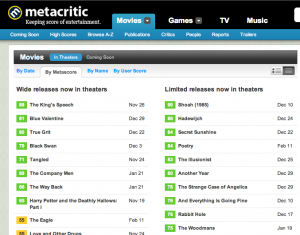– Kind of amazing that, as I write this, there are two Korean films on Andrew O’Hehir’s top movies of 2011, including the No. 1 spot for Lee Chang-dong’s POETRY. Sure, it is early in the year, but I still think that is impressive.
– Currently with a rating of 84 on Metacritic, POETRY is tied for fourth-best rated film in American theaters at the moment — tied with SECRET SUNSHINE (Lee Chang-dong’s previous film). That’s pretty cool, too.

(click on the pic to see larger)
– Interesting stats about movies in Europe in 2010 over at the European Audiovisual Observatory. Overall attendance dropped 2 percent, but different territories varied wildly — Italy leapt 11%, and France had its best year since 1967, but Germany was down 13%, and Spain down 11%.
What was especially interesting for me was the national cinema share in each country. In Korea, domestic movie share has always been a big deal (at least since I started covering its cinema), and it was pretty amazing to see local films steadily rise from around 20% when I first arrived there in the 1990s to a high of 65% in 2006 (and since then, hovering around 40-50%).
Over in Europe, however, no country’s domestic cinema took in over 36% of the box office (except for Turkey, with an impressive 52%). Italy and the Czech Republic both had good years, with local films rising from the low-20’s to 32% and 35% respectively. France was down slightly, but still pretty good at 35.5%. Spain had just 12%.
(You can also click here to see a chart with all the data).
– Very happy to see Mubarak step down. But still so very far to go before Egypt begins to get any real freedom or democracy. Still, that was an important first step. I just hope things work out for them.
– In a related vein, there is a very interesting article by Konrad Lawson at Frog in the Well comparing what is happening now (protests, torture, democracy) in Egypt and the Middle East to Korea’s democracy movement of the 1980s.
– A lot of people talk about media bias, left or right, usually depending on how right or left you are (btw, what a torpid way of viewing life or yourself). But the more I read and work with news aggregators, the more I think the biggest bias in the media is story bias — that is, writers and editors continually try to push events and analysis into easily digestible, high-conflict stories. So a complicated event turns into a decently nuanced analysis in the Wall Street Journal or Financial Times or whatever. But then the news aggregators (like Drudge, Gawker, Newser or whoever, the options are endless these days) get ahold of that original story, find the juiciest quote or idea, and play that up in large fonts and active verbs. And before you know it, everyone is screaming at each other, all over again. Could it be the way we consume news is pushing bias (or at least our perceptions of bias) more than the writers and editors themselves?
(Of course, I am only talking about real news outlets, not silly propaganda/argument machines like Fox, MSNBC, or Huffington).



Leave a Reply